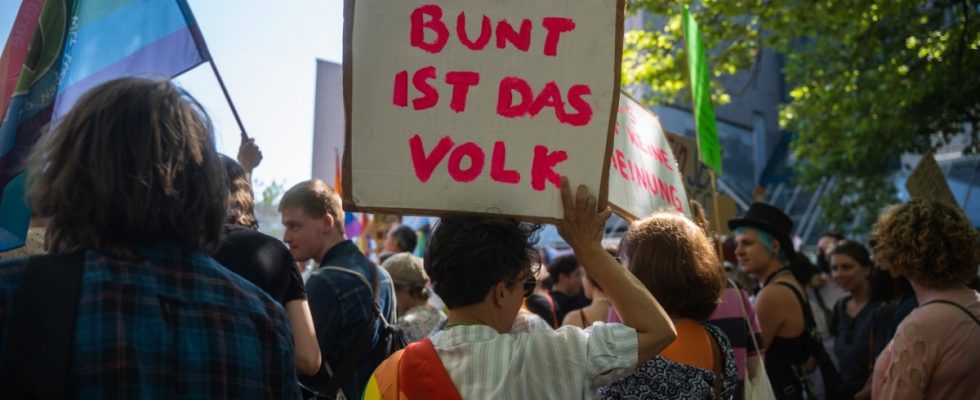Almost 94 percent of queer young people in Bavaria experience discrimination. This comes from the study “How are you?” published on Wednesday. of the Bavarian Youth Ring (BJR) in collaboration with the Institute for Diversity and Anti-Discrimination Research (IDA) and the Fresenius University of Applied Sciences. The research team surveyed more than 2,000 young people between the ages of 14 and 27.
This means that “for the first time, a reliable database is available to examine the living situations and needs of queer young people in Bavaria in more detail,” said BJR President Philipp Seitz at the presentation of the study on Wednesday in Munich. In this way, concrete recommendations for action for politics and youth work can be developed.
“Some of the results are alarming,” said Dominic Frohn, scientific director at the IDA. Nine out of ten respondents have experienced discrimination at least once in their lives. Young people with a trans, non-binary or questioning gender identity (TNQ) experience even more discrimination than those who feel they belong to the gender they were born with (cis). Schools are the place where most discrimination occurs. But experiences of discrimination also occur in public, on the Internet, at work, in health care facilities and in close and extended family circles.
According to the study authors, these are closely related to the well-being and resilience of the respondents. Around 68 percent of queer young people said they had low well-being and low resilience. One could say that the more discrimination young people experience, the lower their well-being and resilience. Both are also lower compared to peers in the general population.
Young queer people are the most open about their LGBTIQA identity with their friends and the least open in the workplace. And they are more open on the Internet than with their family of origin. According to the study authors, there are many low-threshold offers online to deal with one’s gender and sexual identity and to network. Many young people lack such an offer in their immediate area. Over a quarter of those surveyed said that the distance to the nearest queer offering was too great. The optimal journey time is 34 minutes.
But reality looks different. When presenting the study results on Wednesday, Lysander Wöhler described his experiences from working as a board member of the Diversity Munich association: In some cases, queer young people accept a journey time of three hours to visit the offer in Munich because there is none near them. Patrick Wolf, the BJR’s queer representative, also emphasized that there are already a lot of offers, “but not enough”. Queer youth groups are important because they offer young people a protective space. There they are safe from discrimination, find competent contacts and meet other queer young people. The young people do not have to explain themselves and can exchange ideas with others who have similar experiences.
The study also shows that, in addition to expanding leisure activities in their area, young queer people would like to be more aware of LGBTIQA issues in various areas of life – at school, university and work as well as in leisure activities, in churches and other religious communities. This could help ensure more acceptance and support as well as less discrimination, says Frohn. Kora Hackl from the youth network Lambda Bayern is therefore concerned about the discussion about a planned ban on gender. “Dismantling or banning gender-sensitive language, especially in such an area, just shows how little the government here in Bavaria thinks about inclusion,” said Hackl. BJR President Philipp Seitz saw it similarly. Gender-sensitive language expresses social diversity and contributes to greater inclusion.

